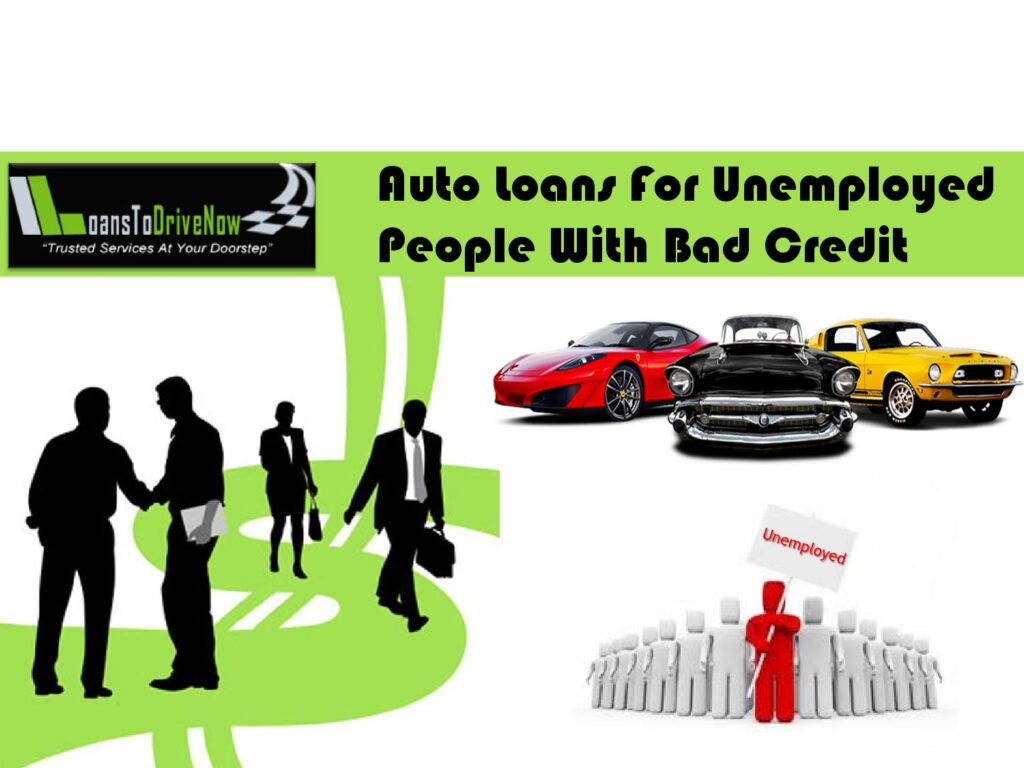I am pleased to present an insightful article that addresses the topic of “Car Finance For Unemployed And Bad Credit.” In today’s challenging economic climate, securing car finance can be particularly daunting for those facing unemployment and carrying a less-than-ideal credit history. This article takes a comprehensive look at the available options and practical advice for individuals in such circumstances, aiming to shed light on this important financial aspect and provide valuable insights to those in need.

1. What is Car Finance?
1.1 Definition and Explanation
Car finance refers to the various options available to individuals who want to purchase a car but may be unemployed or have bad credit. It involves borrowing money from a lender or dealership to pay for the vehicle, and then repaying the loan over a predetermined period of time, typically through monthly installments. Car finance allows individuals to drive a car without having all the necessary funds upfront, making it a popular choice for those who need reliable transportation but may not have the financial means to purchase a vehicle outright.
1.2 Types of Car Finance
There are several types of car finance options available for unemployed individuals with bad credit:
-
Traditional Car Loans: These loans are typically offered by banks, credit unions, or other financial institutions. However, unemployed individuals with bad credit may face difficulty in obtaining these loans due to their lack of employment and poor credit history.
-
Buy Here Pay Here Dealerships: These dealerships offer in-house financing, meaning they finance the vehicles they sell themselves. They typically do not perform credit checks and may be more willing to work with unemployed individuals and those with bad credit. However, they often charge higher interest rates and may have limited vehicle selection.
-
Subprime Lenders: These lenders specialize in providing loans to individuals with less-than-perfect credit. While they may be more flexible in their approval criteria, they often charge higher interest rates to offset the increased risk they assume when lending to individuals with bad credit.
-
Online Lenders: With the rise of online lending platforms, individuals now have the option to apply for car loans online. These lenders may cater to those with bad credit or offer specific products for unemployed individuals. However, it’s important to thoroughly research any online lender before providing personal and financial information.
2. Challenges Faced by Unemployed Individuals with Bad Credit
2.1 Difficulty in Obtaining Traditional Car Loans
Unemployed individuals with bad credit often face challenges in obtaining traditional car loans. When applying for a loan, lenders typically assess the borrower’s ability to repay the loan, which is determined by factors such as employment history and credit score. Unemployment and a poor credit history may be viewed as higher risk, making it difficult to secure approval for a traditional car loan.
2.2 Limited Options for Car Financing
Unemployed individuals with bad credit may find that their options for car financing are limited. Many lenders prefer to work with borrowers who have a steady source of income and a good credit score, as it reduces the risk of default. This limited availability may require individuals to explore alternative financing options specifically designed for those with bad credit or no income.
2.3 High Interest Rates and Down Payments
Unemployed individuals with bad credit may also face higher interest rates and larger down payment requirements. Lenders perceive individuals with bad credit as higher risk borrowers, resulting in higher interest rates to compensate for the increased possibility of default. Similarly, a larger down payment is often required to reduce the lender’s exposure and provide some financial security in case of non-payment.

3. Specialized Car Financing Options for the Unemployed and Bad Credit Individuals
3.1 Buy Here Pay Here Dealerships
Buy Here Pay Here (BHPH) dealerships offer an alternative car financing option for unemployed individuals with bad credit. These dealerships sell and finance vehicles directly to customers, eliminating the need for external financing. BHPH dealerships often do not conduct credit checks, making it easier for those with bad credit to secure financing. However, it’s important to note that BHPH dealerships typically charge higher interest rates than traditional lenders.
3.2 In-House Financing
In-house financing is another specialized car financing option for unemployed individuals with bad credit. Similar to BHPH dealerships, in-house financing eliminates the need for external lenders by providing financing directly through the dealership. This can make it easier for unemployed individuals to secure a car loan, as the dealership may be more lenient with credit requirements. However, as with BHPH dealerships, in-house financing often comes with higher interest rates.
3.3 Subprime Lenders
Subprime lenders specialize in providing loans to individuals with less-than-perfect credit. These lenders understand that bad credit can be the result of various circumstances, including unemployment. While subprime lenders may charge higher interest rates, they may be more willing to work with unemployed individuals. It’s important to carefully consider the terms and conditions of the loan before committing, as higher interest rates can significantly impact the total cost of the loan.
3.4 Online Lenders
The rise of online lending platforms has opened up new opportunities for individuals seeking car financing. There are online lenders that specifically cater to individuals with bad credit or provide specialized loan products for the unemployed. It’s essential to carefully research any online lender and read reviews from other borrowers to ensure legitimacy and avoid falling victim to scams or predatory lending practices.
4. Pros and Cons of Car Financing Options for Unemployed and Bad Credit Individuals
4.1 Pros of Buy Here Pay Here Dealerships
4.1.1 No Credit Checks
One of the advantages of buy here pay here dealerships is that they typically do not perform credit checks. This makes it easier for unemployed individuals with bad credit to secure financing and purchase a car.
4.1.2 Convenient Payment Options
Buy here pay here dealerships often offer flexible and convenient payment options. This can be especially beneficial for unemployed individuals who may have irregular income or need more flexibility in their payment schedule.
4.1.3 Opportunity to Improve Credit Score
By making regular and timely payments on a car loan from a buy here pay here dealership, unemployed individuals with bad credit have the opportunity to improve their credit score. Positive payment history can help rebuild credit and increase future borrowing options.
4.2 Cons of Buy Here Pay Here Dealerships
4.2.1 Limited Vehicle Selection
Buy here pay here dealerships often have a limited selection of vehicles compared to traditional dealerships. This can limit the options available to unemployed individuals with bad credit, potentially leading to settling for a vehicle that may not meet their specific needs or preferences.
4.2.2 High Interest Rates
One of the main drawbacks of buy here pay here dealerships is that they typically charge higher interest rates compared to traditional lenders. This can significantly increase the overall cost of the loan, making it important for borrowers to carefully consider the long-term financial implications.
4.2.3 Higher Risk of Vehicle Repossession
Buy here pay here dealerships may repossess a vehicle if the borrower fails to make timely payments. Unemployed individuals should ensure they fully understand the consequences of missed payments and the potential risk of losing their vehicle through repossession.
4.3 Pros of In-House Financing
In-house financing through dealerships offers several advantages for unemployed individuals with bad credit.
4.4 Cons of In-House Financing
In-house financing also has its limitations and drawbacks that unemployed individuals should be aware of.
4.5 Pros of Subprime Lenders
Subprime lenders provide specialized financing options for individuals with bad credit, including the unemployed. There are several potential advantages to working with subprime lenders.
4.6 Cons of Subprime Lenders
While subprime lenders offer opportunities for unemployed individuals with bad credit, there are some potential drawbacks to be aware of.
4.7 Pros of Online Lenders
Online lenders have become popular due to their convenience and accessibility. Unemployed individuals with bad credit can benefit from the following advantages when considering online lenders.
4.8 Cons of Online Lenders
Despite the advantages, there are some disadvantages to be aware of when considering online lenders for car financing.

5. Documents and Requirements for Car Financing
5.1 Proof of Income
When applying for car financing, unemployed individuals may still need to provide proof of income. This can include documentation such as bank statements, tax returns, or other verifiable sources of income, such as disability benefits or retirement funds.
5.2 Proof of Identity
Proof of identity is typically required to verify the borrower’s identity and prevent fraud. Acceptable forms of identification include a valid driver’s license, passport, or identification card.
5.3 Proof of Residence
Lenders often require proof of residence to determine the borrower’s stability and to ensure they can be contacted if needed. This can be in the form of a utility bill, lease agreement, or other official documents that show the borrower’s current address.
5.4 Additional Documentation
Depending on the lender and the specific circumstances, additional documentation may be required. This can include proof of insurance, references, or any other supporting documents that the lender deems necessary to assess the borrower’s creditworthiness.
6. Tips for Getting Approved for Car Financing with Bad Credit
6.1 Check Your Credit Report and Correct Errors
Before applying for car financing, it’s essential to check your credit report for any errors or discrepancies. Errors can negatively impact your credit score and may result in higher interest rates or even loan denial. If you find any inaccuracies, it’s crucial to dispute them and have them corrected before applying for car financing.
6.2 Improve Your Credit Score
While it may take time, improving your credit score can significantly increase your chances of getting approved for car financing and securing more favorable terms. This includes making timely payments on existing debts, reducing credit card balances, and avoiding applying for new credit unless necessary.
6.3 Save for a Higher Down Payment
A larger down payment can help offset the risk associated with bad credit and unemployment. By saving up for a substantial down payment, you demonstrate your commitment to the loan and reduce the amount you need to finance, which can result in more favorable loan terms.
6.4 Find a Cosigner
Having a cosigner with good credit can strengthen your car financing application and increase the likelihood of approval. A cosigner is legally responsible for repaying the loan if the borrower defaults, providing added security for the lender.
6.5 Research and Compare Lenders
It’s crucial to research and compare different lenders to find the best car financing option for your specific needs. Look for lenders that specialize in working with unemployed individuals or those with bad credit and compare interest rates, loan terms, and any additional fees or charges.
6.6 Get Pre-Approved
Before visiting dealerships or applying for car financing, consider getting pre-approved. Pre-approval provides an estimate of the loan amount you may qualify for and allows you to shop for a car within your budget. It also demonstrates to sellers that you are a serious and qualified buyer.

7. Alternative Options to Car Financing
7.1 Car Leasing
Car leasing can be a viable alternative for those who do not qualify for traditional car financing or prefer not to commit to a long-term loan. Leasing allows individuals to drive a car for a set period of time and typically requires lower monthly payments compared to financing. However, it’s important to consider the mileage restrictions, maintenance responsibilities, and the fact that you do not own the vehicle at the end of the lease term.
7.2 Car Sharing
Car sharing services offer a cost-effective alternative to car ownership. Instead of purchasing or financing a vehicle, individuals can pay for usage on a pay-per-use basis. This option is particularly suitable for those who only need occasional access to a car and may not want the responsibilities of ownership, such as maintenance and insurance.
7.3 Public Transportation or Ride-Sharing Services
For individuals living in areas with reliable public transportation or ride-sharing services, relying on these options may be a more practical and affordable alternative to car financing. Using public transportation or ride-sharing can eliminate the need for car ownership and the associated costs.
7.4 Saving for a Future Car Purchase
Another alternative is to save money over time and make a cash purchase for a car in the future. While this may require patience and discipline, it eliminates the need for financing altogether and allows individuals to avoid the additional costs associated with interest payments.
8. Additional Resources and Assistance for Unemployed Individuals with Bad Credit
8.1 Government Assistance Programs
Unemployed individuals may be eligible for government assistance programs that provide financial support. These programs may help individuals with their everyday expenses, including purchasing a car. It’s important to research and determine if there are any applicable programs in your area and understand the eligibility criteria.
8.2 Non-Profit Organizations
Non-profit organizations may provide assistance to unemployed individuals with bad credit who are in need of reliable transportation. These organizations may offer guidance, support, and access to resources that can help individuals secure affordable car financing or provide alternative transportation options.
8.3 Credit Counseling Services
Credit counseling services can provide valuable guidance and advice to individuals struggling with bad credit. These services can help individuals develop a plan to improve their credit, manage their finances effectively, and explore car financing options that are suitable for their circumstances.
8.4 Employment Services
Unemployed individuals may benefit from utilizing employment services to improve their job prospects and financial stability. Assistance with finding employment can lead to a stable income and increase the chances of getting approved for car financing in the future.

9. Understanding the Risks and Responsibilities of Car Financing
9.1 Understanding the Terms and Conditions
Before signing any car financing agreement, it’s crucial to thoroughly read and understand the terms and conditions. Pay close attention to interest rates, repayment periods, fees, and any additional requirements or obligations.
9.2 Budgeting for Monthly Payments
It’s essential to create a budget that includes the monthly car financing payments and all associated costs, such as insurance, maintenance, and fuel expenses. This ensures that the borrower can comfortably afford the car payments without jeopardizing their financial stability.
9.3 Regular Maintenance and Repairs
Car financing requires borrowers to take responsibility for the regular maintenance and repairs of the vehicle. Proper maintenance can prolong the life of the car and prevent costly repairs down the line. Budgeting for these expenses is important to ensure the vehicle remains in good condition throughout the loan term.
9.4 Insurance Requirements
Car financing typically requires borrowers to maintain comprehensive insurance coverage for the duration of the loan. It’s important to budget for insurance premiums and ensure compliance with the lender’s insurance requirements to avoid defaulting on the loan.
10. Conclusion
Car financing options for unemployed individuals with bad credit exist to provide access to reliable transportation when traditional avenues may not be available. Understanding the different financing options, the associated pros and cons, and the documentation and requirements necessary for approval can help individuals make informed decisions. It’s essential to consider alternative options, such as car leasing or car sharing, and to explore additional resources and assistance available through government programs, non-profit organizations, credit counseling services, and employment services. Lastly, understanding the risks and responsibilities of car financing is crucial to ensure responsible financial management and successful repayment of the loan.


